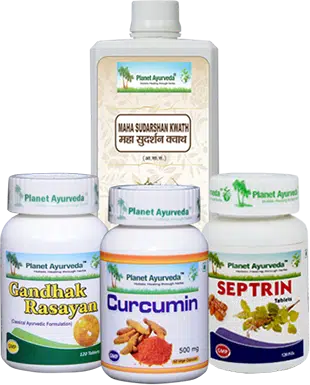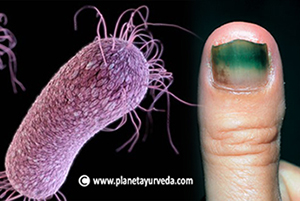ABSTRACT
In recent years a number of viral conditions are spreading at an exponential rate. Like CoronaVirus affected a number of people worldwide, many lost their lives and others suffered major economic losses. Some of the people were hit severely by the repetitive corona waves. Now another virus namely Monkeypox is trending these days and people are scared of the virus. It could again affect many people worldwide. Monkeypox virus is an infectious condition caused by monkeypox virus. It spreads through a number of routes which makes it an issue of concern and manifests with various symptoms. In India, there have been eight cases reported so far. Therefore, prevention becomes an important step to stay safe from this deadly virus. In the following text, we shall have a look at this viral infection and its Ayurvedic management.

INTRODUCTION
Monkeypox is an infectious condition caused by a virus. It usually affects animals and humans. There are various symptoms that are caused by Monkeypox including swollen glands, lesions or blisters, muscle pains, fever. The symptoms may get severe in children, immunocompromised persons and pregnant women and older people. In Ayurveda, the condition can be correlated with pitta dosha vitiation by the aagnatuj factor. Monkeypox is endemic in central or western Africa. But as the cases have been reported among the unusual countries which makes it a concern to the health agencies. Virus has hit the parts of the world where the population lives with each other in close contact which makes the cases of the Monkeypox virus sore further among the crowd. The world is terrified again about the other virus that it can hit their lives once again after the coronavirus.
CAUSATIVE AGENT
A zoonotic virus, Monkeypox virus which belongs to the genus Orthopoxvirus.
Types
- West African clade (less severe)
- Congo Basin clade (more severe)
At Risk
- Person who has physical contact with someone who has symptoms or an animal who is infected with monkeypox virus.
- Lesbian, gay, bisexual and transgender (LGBT community) and who have diverse sexual preferences.
- Children are likely to get infected and develop more severe symptoms due to their low immunity.
- Health care workers can get infected easily due to their nature of job.
- Pregnant women
- Older person
SYMPTOMS
- Headache is a common symptom.
- Blisters or rashes
- Swollen lymph nodes
- Muscle pains
- Fever
- Shivering
- Fatigue can be there
- Chills with fever
- Symptoms related to the respiratory system include sore throat, cough or congestion.
- Rash can appear near genitals or anus but may also appear on feet, hands, mouth, chest or face. Rash can look like blisters or pimples and maybe itchy or painful.
TRANSMISSION CAN SPREAD THROUGH
- Bite or scratch from infective animal
- Contact with bodily fluids of infective animals
- Respiratory transmission
- Virus may enter body through broken skin
- Through sexual contact
- Pregnant women to the foetus through placenta or through contact with an infected person during or after delivery.
DIAGNOSIS
- Polymerase chain reaction (PCR)
- Testing for viral DNA
PREVENTION
- Smallpox vaccine
- Handwashing
- Covering rash
MANAGEMENT
- Supportive
- Oral rehydration solutions
- Antipyretics such as acetaminophen
- Antivirals
- Tecovirimat
COMPLICATIONS
- Infections
- Sepsis
- Encephalitis
- Pneumonia
What are the medical advice that people should follow to stay safe and immune to monkeypox virus
- Limiting contact with suspected cases of the illness or with confirmed ones will reduce the risk of contagion.
- People living with ill person should self isolate and cover the breaks in any on their skin
- Wearing a face mask is important which works better at stopping transmission through respiratory inhalation.
- Washing hands with soap and water or using an alcohol based sanitizer after an exposure to the infected person or their belongings.
- Cleaning and disinfecting the contaminated surfaces and dispose of the contaminated things or washing the infected person’s towels, utensils, clothing and bed sheets with detergent and hot water.
AYURVEDIC MANAGEMENT
Ayurvedic management depends on the pacification of the vitiated dosha and cleansing the blood from the toxins produced by the infective organism. Furthermore, the condition is also managed by boosting immunity and other herbs which possess a number of properties which are against the factors which caused the illness.
- Giloy decoction is of much help in the Monkeypox virus as it increases immunity and reduces fever.
- Tulsi leaves can be boiled in the tea before consumption. Tulsi also reduces fever and acts as an antimicrobial agent.
- Turmeric powder can be mixed in the milk before consumption as it fights the microbes in the body.
HERBAL REMEDIES FOR MONKEYPOX VIRUS BY PLANET AYURVEDA
Planet Ayurveda is an esteemed GMP certified, ISO 9001:2015 certified and US-FDA registered Ayurvedic Company, which sticks to the objective of producing quality Ayurvedic products as described in a number of ancient texts of Ayurveda. Planet Ayurveda has worldwide branches. Products are manufactured without additives and preservatives and other kinds of chemicals or artificial flavour enhancers which can cause a number of side effects on the human body. Products manufactured at Planet Ayurveda are pure and devoid of any kind of adulteration. The products are purely organic and vegetarian and gluten free. Planet Ayurveda has manufactured some of the good products that can surely be of great help in managing the ongoing spread of the Monkeypox virus.
Following is the product list of Planet Ayurveda which possess enough strength to fight this monkeypox virus:-
PRODUCTS LIST
- Curcumin Capsules
- Septrin Tablets
- Maha Sudarshan Kwath
- Gandhak Rasayan
Herbal Remedies For Monkeypox
PRODUCTS DESCRIPTION
1. Curcumin Capsules
Curcumin Capsules are filled with the standardised extract of haridra (Curcuma longa). Haridra possesses antiinflammatory, analgesic, antimicrobial, antiseptic properties which makes it an amazing herbal formulation to be used externally in the Monkeypox condition. It kills the toxins produced by the virus. It reduces fever, soothes rashes or blisters. It also relieves symptoms related to the respiratory system.
Dosage - 1 capsule twice a day with plain water after meals.
2. Septrin Tablets
Septrin are composed of the herbs including haldi (Curcuma longa), pippali (Piper longum), sonth (Zingiber officinale), marich (Piper nigrum), tulsi (Ocimum sanctum) and guggul (Commiphora mukul). The Septrin Tablets are used in a number of infectious conditions caused by a number of microbes including bacteria, virus, protozoa, fungi etc. It possesses analgesic and antipyretic properties. Therefore it makes the fever go down and pain is alleviated. With all these properties Septrin tablets are best used in Monkeypox virus illness.
Dosage - 1 tablet twice a day with plain water after meals.
3. Maha Sudarshan Kwath
Maha Sudarshan Kwath is a classical ayurvedic formulations which is composed of goodness of the herbs namely haritaki (Terminalia chebula), Amla (Emblica officinalis), bibhitaki (Terminalia billerica), haldi (Curcuma longa), kachoor (Curcuma eodaria), sonth (Zingiber officinale), pippali (Piper longum), giloy (Tinospora cordifolia), kutki (Picrorhiza kurroa), pittapapada (Fumaria parviflora), sugandhbala (Valeriana wallichii), ajwain (Trachyspermum ammi), vacha (Acorus calamus), vanshlochan (Bambusa arundinacea) etc. The Ayurvedic formulation is used in influenza like infection and fever. Further it enhances the immunity thus beneficial in fighting infections. It improves the overall wellness of a person. It is of great help in the Monkeypox virus condition.
Dosage - 2 tsp twice a day after meals with plain water.
4. Gandhak Rasayan
Gandhak Rasayan is a formulation in tablet form and contains shuddha gandhak (purified sulphur). Gandhak Rasyan benefits the body in a number of terms. It reduces fever, treats skin conditions such as rashes and blisters and acts as a potent antimicrobial, nativiral, antibacterial, anti inflammatory, anthelmintic, antioxidant, antipyretic agent. With all these properties Gandhak Rasayan is beneficial in Monkeypox virus as it reduces forever, manages rashes, fights viruses and improves overall wellness.
Dosage - 1 tablet twice a day with lukewarm water after meals.
CONCLUSION
Monkeypox is spreading its notorious infestation everyday around the globe. It is a matter of concern for all the countries as the economies of different nations are still recovering from the damage caused by the coronavirus. And another virus is again knocking the door. So it is a duty of the people to take preventive measures to stop the spread of the monkeypox virus and help the needful while protecting themselves. As we heard in our lifetime ‘prevention is better than cure’, so this is the time we take preventive steps to check the spread of the monkeypox virus. With proper preventive measures we all together can decelerate the viral spread of the monkeypox. As we have learned about the monkeypox virus and how it spreads, therefore, we do know how to stop its transmission with adequate steps. Smallpox vaccine is a useful protective armour against the monkeypox virus. And we have discussed what herbal management is available for the monkeypox virus. So let’s choose the herbal way to defend ourselves and fight the ill and hurtful intentions of the monkeypox virus. Be Safe By Taking Preventive Measures Strictly!!!






